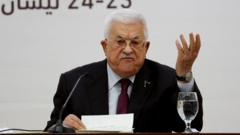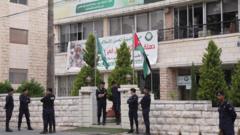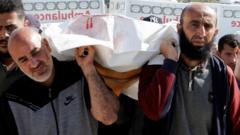The move to ban the Muslim Brotherhood, a prominent political force in Jordan, is expected to have significant impacts on the nation's opposition landscape and civil liberties.
Jordan's Drastic Action: Muslim Brotherhood Ban Sparks Controversy

Jordan's Drastic Action: Muslim Brotherhood Ban Sparks Controversy
Jordan prohibits the Muslim Brotherhood, raising questions about political dissent and democratic processes.
Jordan has taken a bold step by prohibiting the Muslim Brotherhood, accusing the organization of planning hostile activities within its borders. This sweeping ban, announced on Wednesday, may effectively dismantle the Islamic Action Front, which has been a leading opposition party in the country. The Islamic Action Front gained ground in Parliament after campaigning against what they deemed an Israeli incursion into Gaza.
To understand the implications of this ban, it's vital to account for the historical background of the Muslim Brotherhood. Founded in 1928 by Hassan al-Banna in Egypt, the group initially aimed for a revival of Islamic values to counter colonialism and Western influence. Al-Banna's ambiguous ideas about governance have given rise to a myriad of political movements, each interpreting the Brotherhood's tenets in different ways.
Across the Middle Eastern landscape, groups associated with the Brotherhood may not always carry its name, leading to a complex tapestry of both direct affiliations and independent offshoots that claim inspiration from its ideology. The recent measures in Jordan are likely to reshape both political discourse and civil freedoms, shining a light on broader regional tensions and the policing of dissent.
To understand the implications of this ban, it's vital to account for the historical background of the Muslim Brotherhood. Founded in 1928 by Hassan al-Banna in Egypt, the group initially aimed for a revival of Islamic values to counter colonialism and Western influence. Al-Banna's ambiguous ideas about governance have given rise to a myriad of political movements, each interpreting the Brotherhood's tenets in different ways.
Across the Middle Eastern landscape, groups associated with the Brotherhood may not always carry its name, leading to a complex tapestry of both direct affiliations and independent offshoots that claim inspiration from its ideology. The recent measures in Jordan are likely to reshape both political discourse and civil freedoms, shining a light on broader regional tensions and the policing of dissent.



















